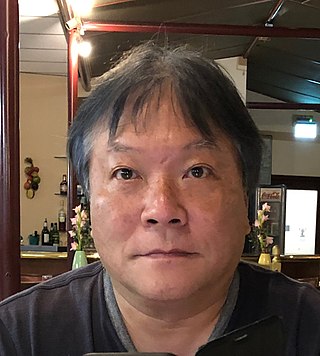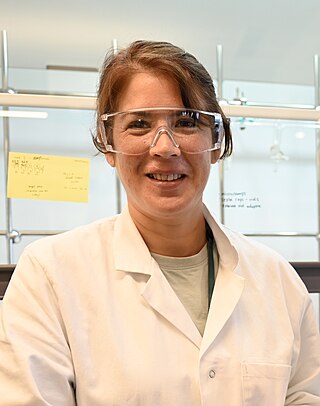Related Research Articles

A photoresist is a light-sensitive material used in several processes, such as photolithography and photoengraving, to form a patterned coating on a surface. This process is crucial in the electronics industry.
Jean M.J. Fréchet is a French-American chemist and professor emeritus at the University of California, Berkeley. He is best known for his work on polymers including polymer-supported chemistry, chemically amplified photoresists, dendrimers, macroporous separation media, and polymers for therapeutics. Ranked among the top 10 chemists in 2021, he has authored nearly 900 scientific paper and 200 patents including 96 US patents. His research areas include organic synthesis and polymer chemistry applied to nanoscience and nanotechnology with emphasis on the design, fundamental understanding, synthesis, and applications of functional macromolecules.
Robert George Bergman is an American chemist. He is Professor of the Graduate School and Gerald E. K. Branch Distinguished Professor Emeritus at the University of California, Berkeley.

Omar M. Yaghi is the James and Neeltje Tretter Chair Professor of Chemistry at the University of California, Berkeley, an affiliate scientist at Lawrence Berkeley National Laboratory, the Founding Director of the Berkeley Global Science Institute, and an elected member of the US National Academy of Sciences as well as the German National Academy of Sciences Leopoldina.

Takuzo Aida is a polymer chemist known for his work in the fields of supramolecular chemistry, materials chemistry and polymer chemistry. Aida, who is the Deputy Director for the RIKEN Center for Emergent Matter Science (CEMS) and a Distinguished University Professor at the University of Tokyo, has made pioneering contributions to the initiation, fundamental progress, and conceptual expansion of supramolecular polymerization. Aida has also been a leader and advocate for addressing critical environmental issues caused by plastic waste and microplastics in the oceans, soil, and food supply, through the development of dynamic, responsive, healable, reorganizable, and adaptive supramolecular polymers and related soft materials.

JoAnne Stubbe is an American chemist best known for her work on ribonucleotide reductases, for which she was awarded the National Medal of Science in 2009. In 2017, she retired as a Professor of Chemistry and Biology at the Massachusetts Institute of Technology.

Egbert (Bert) Willem Meijer is a Dutch organic chemist, known for his work in the fields of supramolecular chemistry, materials chemistry and polymer chemistry. Meijer, who is distinguished professor of Molecular Sciences at Eindhoven University of Technology (TU/e) and Academy Professor of the Royal Netherlands Academy of Arts and Sciences, is considered one of the founders of the field of supramolecular polymer chemistry. Meijer is a prolific author, sought-after academic lecturer and recipient of multiple awards in the fields of organic and polymer chemistry.
Laura Lee Kiessling is an American chemist and the Novartis Professor of Chemistry at the Massachusetts Institute of Technology. Kiessling's research focuses on elucidating and exploiting interactions on the cell surface, especially those mediated by proteins binding to carbohydrates. Multivalent protein-carbohydrate interactions play roles in cell-cell recognition and signal transduction. Understanding and manipulating these interactions provides tools to study biological processes and design therapeutic treatments. Kiessling's interdisciplinary research combines organic synthesis, polymer chemistry, structural biology, and molecular and cell biology.

Brian M. Stoltz is currently a professor of chemistry at the California Institute of Technology. The primary focus of his research is chemical synthesis with an emphasis on expanding the scope of allylic alkylation for the preparation of complex molecules possessing unique structural, biological, and physical properties. His research involves the total synthesis of natural products such as dragmacidin F and (–)-cyanthiwigin F, and development of synthetic reactions to access quaternary stereocenters. Specifically, he has focused on the allylic alkylation of enolates, developing an enantioselective variant in 2004.

Zhenan Bao is a Chinese-born American chemical engineer. She serves as K. K. Lee Professor of Chemical Engineering at Stanford University, with courtesy appointments in Chemistry and Material Science and Engineering. She served as the Department Chair of Chemical Engineering from 2018 to 2022. Bao is known for her work on organic field-effect transistors and organic semiconductors, for applications including flexible electronics and electronic skin.
Karen L. Wooley is an American polymer chemist. She is a Distinguished Professor at Texas A&M University whose research focuses on developing novel polymers and nanostructured materials. Previously, she was the James S. McDonnell Distinguished University Professor in Arts & Sciences at Washington University in St. Louis.

This is a list of women chemists. It should include those who have been important to the development or practice of chemistry. Their research or application has made significant contributions in the area of basic or applied chemistry.
William Dichtel is the Robert L. Letsinger Professor of Chemistry at Northwestern University and a 2015 MacArthur Fellow who has helped pioneer the development of porous polymers known as covalent organic frameworks. Dichtel was awarded a Guggenheim Fellowship in 2018. In 2020, Dichtel was selected as the 2020 Laureate in Chemistry of the Blavatnik Awards for Young Scientists. He also founded Cylopure, a university spin-off that seeks to bring to market water filtration with cyclodextrin polymers.

Timothy M. Swager is an American Scientist and the John D. MacArthur Professor of Chemistry at the Massachusetts Institute of Technology. His research is at the interface of chemistry and materials science, with specific interests in carbon nanomaterials, polymers, and liquid crystals. He is an elected member of the National Academy of Sciences, American Academy of Arts and Sciences, and the National Academy of Inventors.
Eric V. Anslyn is an American chemist, University Distinguished Teaching Professor, and Welch Regents Chair in Chemistry at the University of Texas at Austin. He previously held the Norman Hackerman Professorship. Anslyn is co-author of Modern Physical Organic Chemistry, an introductory graduate textbook.
Jennifer S. Brodbelt is an American chemist known for her research using mass spectrometry to characterize organic compounds, especially biopolymers and proteins.
Malika Jeffries-EL is an American chemist and professor of chemistry at Boston University studying organic semiconductors. Specifically, her research focuses on developing organic semiconductors that take advantage of the processing power of polymers and the electronic properties of semiconductors to create innovative electronic devices. She was elected as a Fellow of the American Chemical Society in 2018.

Natalie Stingelin, Fellow of the Materials Research Society and Royal Society of Chemistry, is a materials scientist and current chair of the School of Materials Science and Engineering at the Georgia Institute of Technology, the University of Bordeaux and Imperial College. She led the European Commission Marie Curie INFORM network and is Editor-in-Chief of the Journal of Materials Chemistry C and Materials Advances.
Kenichiro Itami is a Japanese chemist. He is a professor at Nagoya University in the Department of Chemistry, Graduate School of Science, director of Institute of Transformative Bio-Molecules (WPI-ITbM), Nagoya University and the Research Director of the Itami Molecular Nanocarbon Project (JST-ERATO). He received his Ph.D in Engineering from the Department of Synthetic Chemistry and Biological Chemistry from Kyoto University. Itami was held responsible, and the Japan Science and Technology Agency (JST) and the Japan Society for the Promotion of Science (JSPS), which determine the allocation of government research funds, have stopped granting research funds as a penalty until the end of March 2025 from the university. Despite this, RIKEN, which is funded mainly by research fees from the government, hired Itami and obtained about 50 million yen in research funding. He pioneered a loophole that allowed him to obtain research funding by belonging to a national research corporation even if his research funding from the government was suspended due to research misconduct.

Christine Luscombe is a Japanese-British chemist who is a professor at the Okinawa Institute of Science and Technology. Her research investigates polymer chemistry, organic electronics, organic photovoltaics and the synthesis of novel materials for processable electronics. She serves on the editorial boards of Macromolecules, Advanced Functional Materials, the Annual Review of Materials Research and ACS Applied Materials & Interfaces.
References
- ↑ "C. Grant Willson". www.che.utexas.edu. Retrieved 2024-05-04.
- 1 2 3 4 5 6 7 8 9 "Willson Research Group - C. Grant Willson Bio". willson.cm.utexas.edu. Retrieved 2024-05-04.
- 1 2 3 4 5 6 "The Japan Prize Foundation". The Japan Prize Foundation. Retrieved 2024-05-04.
- 1 2 "Professor C. Grant Willson". NAE Website. Retrieved 2024-05-04.
- ↑ "Dr. C. Grant Willson awarded a National Medal of Technology and Innovation". cm.utexas.edu. Retrieved 2024-05-04.
- ↑ "Professor C. Grant Willson elected to the inaugural group of Fellows of the American Chemical Society". cm.utexas.edu. Retrieved 2024-05-04.
This article needs additional or more specific categories .(August 2024) |